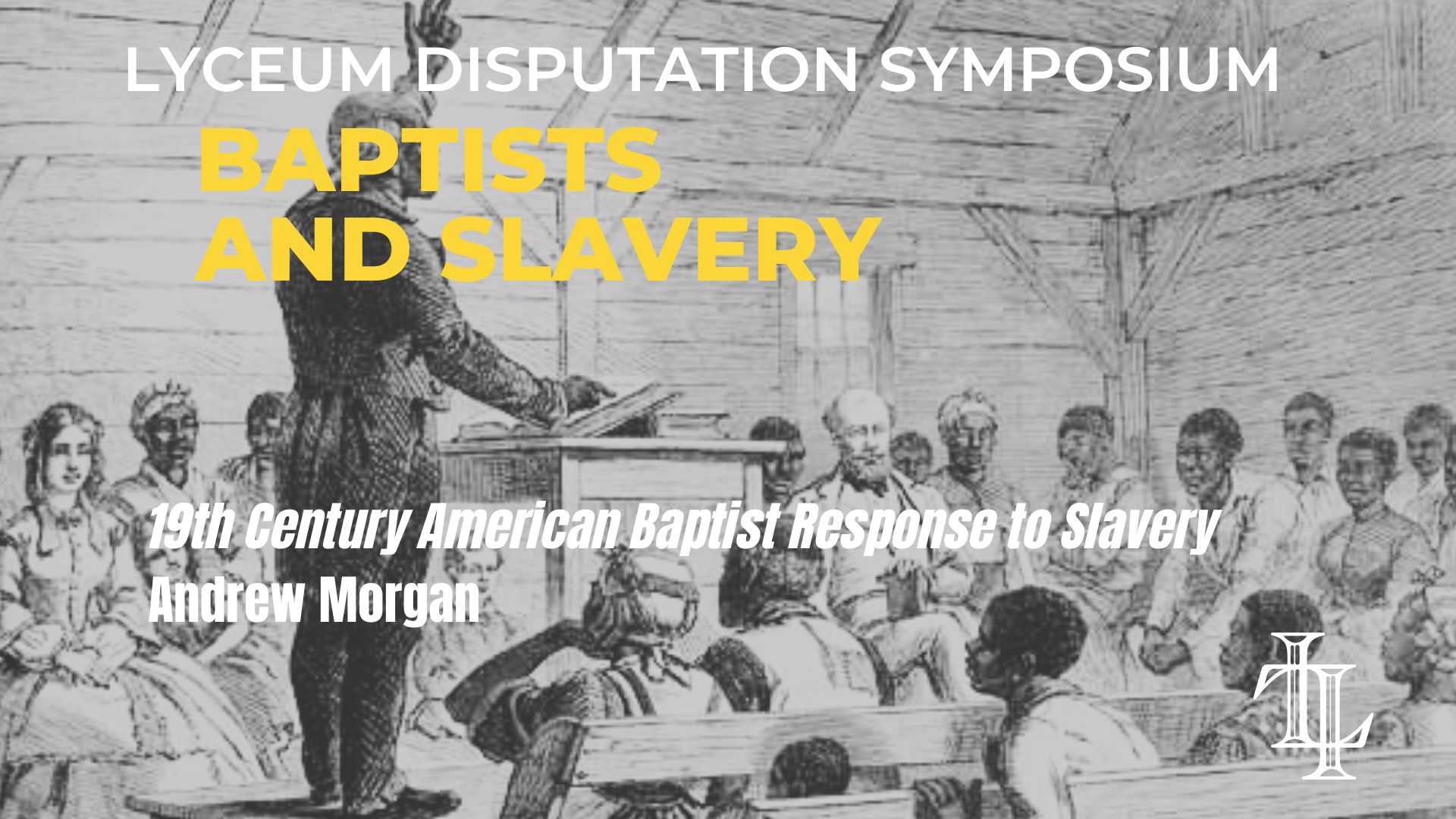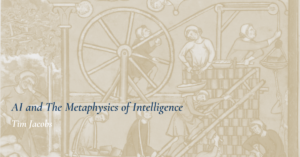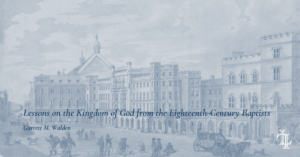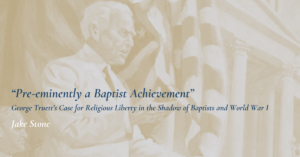Editor’s Note: This is part 1 of our Lyceum Disputation series considering how Baptists responded to American slavery. As with all our work, the London Lyceum publishes a range of viewpoints to encourage thinking.
In 1844, Richard Fuller (1804–1876) composed a letter to the editor of the Christian Reflector, a Boston based newspaper for Massachusetts Baptists. Fuller’s letter addressed “the abolition doctrine” that “slavery is a moral evil ….”[1] For Fuller, the North’s growing excitement over abolition, its divisive effect upon the nation’s churches, and degradation of southern Christian slave owners’ reputations was deeply troubling. Thus, he wrote to address these concerns in hopes of staving off schism and setting the record straight. “My chief hope for the Union,” Fuller declared, “is in the conservative power of religion, and the day is not far when that power will be required in all its stringency.”[2] In his letter, Fuller referenced the outspoken anti-slavery northern Baptist, Francis Wayland (1796–1865), who, upon reading Fuller’s letter, felt compelled to respond. Mark Noll describes what ensued as “one of the United States’ last serious one-on-one debates where advocates for and against slavery engaged each other directly, with reasonable restraint, and with evident intent to hear out the opponent to the extent possible.”[3] Nathan Finn and Keith Harper further note how Fuller and Wayland’s published debate “quickly became required reading for anyone interested in slavery.”[4] As leading nineteenth-century American Baptists, these men’s views divergent views influenced many within their denomination. Yet, as contrary as were their conclusions, Fuller and Wayland shared much in common. This article will address the underlying causes of these men’s opposing views, while also highlighting that upon which they agreed.
Fuller based his pro-slavery apology on what he considered to be the ultimate authority, the Bible. He argued, “The issue now before us regards the essential moral character of slavery; and on such a question I am strongly disposed to pass by all ethical and metaphysical dissertation, and appeal at once to the only standard of right and wrong which can prove decisive … It is, then, the responses of the sacred oracles to which we must after all appeal.”[5] Both Fuller and Wayland were confessional Calvinists who agreed upon Scripture’s place of authority. They made the Scriptures so central to their arguments that D. H. Dilbeck defines their exchange as a “biblical debate.”[6] However, despite the common authority to which both men appealed, they did not share the same conclusions.
Fuller and Wayland’s disagreement resulted from differing hermeneutics. Wayland believed Scripture denounced slavery as a sin, not explicitly, but through inculcating principles that undermined its practice. Wayland’s criticism was not entirely new. Mitchell Snay argues, “[T]he abolitionist interpretation of the Bible is well illustrated in a sermon delivered in 1834 by the Rev. James T. Dickinson before the Second Congregational Church of Norwich, Connecticut.”[7] Dickinson’s hermeneutic resulted in the abolition argument that slavery “is a system of oppression, and therefore is regarded by the Bible as sin.”[8] Wayland shared Dickinson’s conclusion; however, he insisted that slavery was sinful because in Scripture, God progressively revealed principles of morality that made slavery’s continued practice biblically untenable.[9] Both Dickinson and Wayland’s hermeneutic carried what Noll describes as
A double burden of staggering dimensions. On the one hand, they had to execute the delicate intellectual task of showing that straightforward, proslavery conclusions did not adequately exegete the biblical texts. On the other hand, they also were compelled to perform a religious high-wire act by demonstrating why arguments against slavery should not be regarded as infidel attacks on the authority of the Bible itself.[10]
Fuller’s response reflected the biblicism marking the majority of nineteenth-century southern evangelicals in general and Baptists in particular.[11] He insisted that “WHAT GOD SANCTIONED IN THE OLD TESTAMENT, AND PERMITTED IN THE NEW CANNOT BE SIN.”[12] For Fuller, the Scripture’s failure to explicitly condemn slavery confirmed the practice was not always a sin. Fuller’s position was not novel. In 1823, Richard Furman presented South Carolina’s Governor with “the views of Baptists relative to the coloured population of the United States.” Furman argued that “In the Old Testament, the Israelites were directed to purchase their bond-men and bond-maids of the Heathen nations.”[13] He also noted how “In the New Testament … the masters are not required to emancipate their slaves but to give them the things that are just and equal, forbearing threatening; and to remember, they also have a master in Heaven.”[14] Less than ten years later, Thomas Dew authored what northern abolitionist Leonard Bacon considered the definitive pro-slavery apology, Review of the Debate in the Virginia Legislature, 1831–1832. In Bacon’s opinion “all the unqualified and shameless defenses of slavery that have been uttered at the south since 1832” seemed to have been drawn “directly or indirectly from the great repository and arguments,” in Dew’s work.[15] Dew, like Furman before him, argued, “Slavery was established and sanctioned by divine authority, among even the elect of heaven, the favored children of Israel.”[16] Thus, in his biblicism, Fuller stood in good company in rejecting Wayland’s reasoning, and he cautioned him against his hermeneutic.
Unsurprisingly, Fuller regarded Wayland’s denial that slavery could be vindicated by Scripture as extremely dangerous. For Fuller, Scripture’s witness to slavery as common and accepted practice was so clear, abolitionists were being forced to “wrest these Scriptures,” and this “to [their] own destruction.”[17] Fuller identified the “lamentable effects of modern ultraism” in the abolitionist’s approach, arguing they distorted the true meaning of Scripture to suit their fancy as the interpreter.[18] In Fuller’s words:
I assume that both Testaments constitute one entire canon, and that they furnish a complete rule of faith and practice …. If, then, a work be good, we are thoroughly instructed in the Bible as to it; and have there reproof and correction, at once convincing us of any work which is evil …. Now there was a time when Roman Catholics alone refused to receive the Bible as the perfect rule of faith … such a time, however, is fast getting to be no more. In Germany, even men like Neander, while they admit the futility of pleading apostolic authority for some time honored, hereditary sanctities, yet adhere to them, on the ground … that the Scriptures have an “expansion of sense and meaning.” In this country it is with profound grief that I see the same spirit at work …. You say—“Suppose, then, that slavery were permitted in the New Testament, and at the same time these truths at variance with it are inculcated, it would be evident that the permission must yield to the principle.” Now, I submit to you, that this supposition not only makes the Bible contradict itself, but opens the door to a flood of error.[19]
For Fuller, Wayland’s hermeneutic threatened to undo the grounds for Christian faith and unity, thus he stood resolutely behind his thesis—slavery was not always sinful.
Wayland recognized Fuller’s principle concerns and shared them. Concluding the men’s exchange, Wayland noted “the more frequently I have read your letters, the more deeply have I been impressed with the coincidence of opinion that exists between us.”[20] For Wayland, Fuller’s desire for national unity was admirable and reflected his own sentiments. Similarly, he shared Fuller’s frustration at northern abolitionists’ unqualified condemnation of southern Christian slaveholders. Surprisingly, Deborah Bingham Van Broekhoven argues that these points of agreement, while noble, actually “undermined programs that Wayland assumed his moderate voice would promote—Baptist unity and gradual emancipation.”[21] Van Broekhoven insists that Wayland’s “frequent silences and close relationships with southern leaders caused radical abolitionists to condemn him as proslavery.”[22] However, while Wayland may have valued Fuller’s friendship and shared his desire for gospel unity and doctrinal integrity, his understanding of the slave’s actual condition differed significantly from the southerner’s.
For Wayland, slavery could not be defined solely as “an obligation to labor for the benefit of the master, without the contract or consent of the slave,” as Fuller argued.[23] Wayland’s definition included the master’s “right to oblige the slave to labor for his (the master’s) benefit.”[24] Wayland conveyed his understanding of this right’s actual practice with an illustration:
Let us suppose that your family and mine were neighbors. We, our wives and children, are all human beings in the sense that I have described, and in consequence of that common nature, and by the will of our common Creator, are subjects to the law, Thou shalt love thy neighbor as thyself [Matthew 19:19]. Suppose that I should set fire to your house, shoot you as you came out of it, and seizing upon your wife and children, “oblige them to labor for my benefit, without their contract or consent.” Suppose, moreover, aware that I could not thus oblige them, unless they were inferior in intellect to myself, I should forbid them to read, and thus consign them to intellectual and moral imbecility … Suppose I should exercise this dominion over them and their children as long as I lived, and then do all in my power to render it certain that my children should exercise it after me … The question before us I suppose to be simply this, would I, in so doing, act at variance with the relations existing between us as creatures of God?[25]
For Wayland, discussions of slavery, even in the abstract, required depictions of the violence marking its practice.
Unsurprisingly, considering Fuller’s positive childhood experience of slavery on a South Carolina plantation, the southerner took offense at Wayland’s illustration. Fuller rejected Wayland’s addition of a master’s right to oblige the slave to labor for the master’s benefit, preferring the term power to convey the master’s privilege. For Fuller, the reality of slavery’s abuses could not be reconciled with a master’s God-given role. He confessed, “The power of the master I therefore admit. I admit, too, its frequent and shameful abuse, and I unite with you in deploring and condemning this as heinous sin. But to include in the idea of slavery ‘the right’ to oppress and degrade, is to confound two things entirely distinct, and which really have no sort of connection.”[26] Fuller accepted Wayland’s critique of chattel slavery’s horrific abuses, however, he resisted admitting such abuses were the norm. While Wayland took the circulating stories regarding the inhuman treatment of slaves in the South to be accurate, Fuller, it appears, did not. Fuller accused Wayland of allowing isolated and extreme incidences of slave abuse to influence his argument. In fact, Fuller went so far as to say:
I think, my dear brother, it will appear to yourself, on a review of our letters thus far, that, in order to justify your condemnation of slavery, as always a crime, you have constantly found it necessary to surcharge it with merely imaginary, or at worst, accidental evils; and to blacken it as much as possible. Fire, sword, gunpowder, and the wanton violation of all human rights, are put in requisition; whereas, you were bound to confine yourself to the strict essentials, and prove them sinful. On the contrary, while my proposition required me only to speak of the most benignant form and origin of the institution.[27]
For Fuller, slavery was a divinely permitted institution, practiced by the Patriarchs, and preserved by the apostles. Fuller was so confident in his view’s orthodoxy that he admitted, “If slavery be a sin, then, it should be at once abolished.”[28] He then warned, however, that immediate emancipation “would be a revolution involving the entire South in ruin” by “breaking up all social order and peace and safety” and “inflicting on the slaves irreparable mischief.”[29] Matthew Hill rightly identifies “Southern fears of social leveling, and the entrenched paternalism toward an emancipated slave population” in these statements, which also provide further attestation to Fuller’s peculiar synthesis of his beliefs about slavery with his Christian convictions.[30] Fuller’s experiences of slavery clearly influenced his perspective, leading him to remark that “after admitting and deploring much abuse of slavery at the South, I still humbly hope that God sees here the sincerest friends of the African race; nor would we stint our benevolence towards them.”[31] Fuller’s confidence in what he considered to be the slave’s actual experience even led him to invite Wayland to visit the South and see for himself.
For Fuller, the abolitionists’ claims concerning the slaves’ ill-treatment and suffering were grossly exaggerated and largely based upon hearsay. In response to Wayland’s references to South Carolina’s frightful slave-laws, Fuller admitted that they were harsh. However, he insisted “that most of them are virtually repealed by universal practice.”[32] He noted how the law “forbidding slaves to assemble without the presence of so many white persons, is a dead letter, whenever the meeting is for religious purposes,” adding that “missionaries are everywhere traversing the land, and preaching the gospel to multitudes of slaves without molestation.”[33] In these gospel opportunities, Fuller made sure to reference his and his church’s efforts, revealing, “the Beaufort church employs six or seven brethren constantly in this good work; and here, in the country, I walk, every Sabbath, and occasionally in the week, about a mile, and violate this statute most industriously.”[34] Fuller desired that Wayland understand what he considered to be the actual state of slavery in the South.
Unfortunately, Fuller’s rose-colored rendering failed to represent reality. His concessions to slavery’s abuses, tightfisted as they were, reveal his appreciation of the widespread suffering of many slaves in the South. Fuller was not ignorant of slavery’s horrors. However, it would seem he desired for his narrative to be the only narrative. He hinted at this posture with his preference for the term “servant” to “slave,” which fit more comfortably into his definition and professed experience of the institution. Fuller’s choice of language reveals his paternalistic and overly optimistic interpretation of the institution. Thus, for Fuller, “slavery [was] bondage,” reflecting a restriction of personal liberty not too unlike that experienced by a nation’s citizenry at their government’s hand.[35] Fuller also likened the limits reflected by the slave-master relation to a parent’s authority over their child. He argued, “A father has a right to the services of his child during minority,” however, he insisted, “the very law which gives him the control of his child, place[s] him under the strongest obligations to promote that child’s best and eternal interests.”[36] Thus, as Fuller acknowledged the slave’s vulnerable position, he also insisted upon the master’s responsibility to provide protection, cloaking white supremacy in the language of southern evangelical piety.
Yet, Fuller took this responsibility seriously, revealing the complicated nature of his views. He informed Wayland, “In a familiar correspondence like this, I may be pardoned for saying, that, during twelve years, I have devoted the salary given me, whenever at my disposal, to the spiritual instruction of the slaves; and am now doing so.”[37] Further, he noted:
With reference to my own servants, their condition is as good as I can make it. They are placed under a contract, which no instrument of writing could make more sacred. By this contract they, on their part, perform not one half the work done by free laborers; and I, on my part, am bound to employ a missionary to teach and catechize them and their children; to provide them a home, and clothes, and provisions, and fuel, and land to plant for themselves; to pay all medical bills; to guaranty to them all the profits of their skill and labor, in their own time; to protect them as a guardian; and to administer to the wants of the children, and of those that are sick, and infirm, and aged.[38]
Wayland celebrated Fuller’s testimony and optimistically opined “this … is to me a new view of the institution of domestic slavery, and I must add that it pleases me incomparably better than any that I have ever seen.”[39] However, Wayland appreciated that Fuller’s descriptions of his slaves’ experiences reflected an ideal scenario, if such a thing could exist, therefore, he refused to accept this was normative in the South. Wayland even raised this concern with Fuller, noting, “I very much fear that when slavery is spoken of at the South, it is spoken of, not as you define and defend it, but as it actually exists.”[40] Further, Wayland rightly cautioned Fuller, “is there not reason to fear that, on your authority, the attributes of God will be appealed to, to sanction, not the abstract idea of it, which you believe to be in harmony with the word of God, but the whole system, just as it exists.”[41] Wayland may have shared Fuller’s high view of Scripture and like his southern compatriot longed for unity, recognizing slavery’s role in the growing chasm between North and South. However, Wayland’s hermeneutic led him unavoidably to view slavery as a moral evil. Thus, he attempted to direct Fuller to see beyond his personal experiences with slavery and its portrayal in the Scriptures to the institution’s actual practice as defined by the widespread slave abuse and suffering that marked the antebellum South. Sadly, Wayland failed and the growing rift within the Baptist denomination over the matter, culminating in the formation of the Southern Baptist Convention in 1845, only revealed the reach of Fuller’s pro-slavery sentiments.
[1] Richard Fuller, “Letter from the Rev. Richard Fuller, D.D., on the Subject of Slavery,” Christian Reflector 12.45 (7 November 1844): 178.
[2] Fuller, “Letter from the Rev. Richard Fuller,” 178.
[3] Mark Noll, The Civil War as a Theological Crisis (Chapel Hill, NC: University of North Carolina Press, 2006), 36–37.
[4] Richard Fuller and Francis Wayland, Domestic Slavery Considered as a Scriptural Institution, ed. Nathan A. Finn and Keith Harper (Macon, GA: Mercer University Press, 2008), xi.
[5] Richard Fuller, “Letter II: To the Rev. Francis Wayland, D.D.,” Christian Reflector 13.5 (30 January 1845): 18.
[6] D. H. Dilbeck, “‘Calm yet Earnest Attention’—The Richard Fuller-Francis Wayland Slavery Debate of 1844–45, Baptist Denominational Division, and the Coming of the Civil War,” Baptist History and Heritage 48.2 (Summer 2013): 67.
[7] Mitchell Snay, Gospel of Disunion, Religion and Separatism in the Antebellum South (Chapel Hill, NC: University of North Carolina Press, 1997), 55.
[8] James T. Dickinson, A Sermon, delivered in the Second Congregational Church, Norwich, on the fourth of July, 1834, at the Request of the Anti-Slavery Society of Norwich & Vicinity (Norwich, CT: The Anti-Slavery Society, 1834), 4.
[9] Francis Wayland, “Letter VI: To the Rev. Richard Fuller, D.D.,” Christian Reflector 12.51 (19 December 1844): 202.
[10] Mark Noll, “The Bible and Slavery,” in Religion and the American Civil War, ed. Randall M. Miller, Harry S. Stout, and Charles Reagan Wilson (New York: Oxford University Press, 1998), 44.
[11] Biblicism is the literal approach taken to understanding the Scriptures.
[12] Richard Fuller, “Letter IV: To the Rev. Francis Wayland, D.D.,” Christian Reflector 13.7 (13 February 1845): 26.
[13] Richard Furman, Rev. Dr. Richard Furman’s Exposition of the Views of the Baptists, Relative to the Coloured Population in the United States in a Communication to the Governor of South Carolina (Charleston, SC: A. E. Miller, 1823), 7.
[14] Furman, Views of Baptists, 8.
[15] Leonard Bacon, Slavery Discussed in Occasional Essays, from 1833 to 1846 (New York: Baker and Scribner, 1846), 96.
[16] Thomas Dew, “Review of the Debate in the Virginia Legislature, 1831–1832,” in The Pro-Slavery Argument, as Maintained by the Most Distinguished Writers of the Southern States, Containing Essays, on the Subject, of the Chancellor, Harper, Governor Hammond, Dr. Simms, and Professor Dew (Philadelphia: Lippincott, Grambo, & Co., 1853), 295.
[17] Fuller, “Letter IV,” 26.
[18] Fuller, “Letter IV,” 26.
[19] Fuller, “Letter IV,” 26.
[20] Fuller and Wayland, Domestic Slavery, 166. This letter was not carried by the Christian Reflector; it was only included in the print version of Domestic Slavery.
[21] Deborah Bingham Van Broekhoven, “Suffering with Slaveholders: The Limits of Francis Wayland’s Antislavery Witness,” in Religion and the Antebellum Debate over Slavery, ed. John R. McKivigan and Mitchell Snay (Athens, GA: University of Georgia Press, 1998), 198.
[22] Van Broekhoven, “Suffering with Slaveholders,” 197.
[23] Richard Fuller, “Letter II: To the Rev. Francis Wayland, D.D.,” Christian Reflector 13.5 (30 January 1845): 18.
[24] Francis Wayland, “Letter II: To the Rev. Richard Fuller, D.D.,” Christian Reflector 12.47 (21 November 1844): 186.
[25] Wayland, “Letter II,” 186.
[26] Fuller, “Letter II,” 18.
[27] Richard Fuller, “Letter III: To the Rev. Francis Wayland, D. D.,” Christian Reflector 13.6 (6 February 1845): 22.
[28] Fuller, “Letter I: To the Rev. Francis Wayland, D. D.,” Christian Reflector 13.4 (23 February 1845): 14.
[29] Fuller, “Letter I,” 14.
[30] Matthew Hill, “God and Slavery in America: Francis Wayland and the Evangelical Conscience” (PhD diss., Georgia State University, 2008), 134.
[31] Richard Fuller, “Letter VI: To the Rev. Francis Wayland, D.D.,” Christian Reflector 13.9 (27 February 1845): 33–34.
[32] Fuller, “Letter III,” 22.
[33] Fuller, “Letter III,” 22.
[34] Fuller, “Letter III,” 22.
[35] Fuller, “Letter II,” 18; Fuller, “Letter III,” 22.
[36] Fuller, “Letter II,” 18.
[37] Fuller, “Letter VI,” 33–34.
[38] Fuller, “Letter VI,” 33–34.
[39] Fuller and Wayland, Domestic Slavery, 171.
[40] Fuller and Wayland, Domestic Slavery, 183.
[41] Fuller and Wayland, Domestic Slavery, 183–84.
Author
-

Andrew Morgan is the pastor of Immanuel Baptist Church in Salisbury, MD. He holds a Ph.D. in historical theology from Southeastern Baptist Theological Seminary. Andrew was born and raised in southern Africa where his parents served as IMB missionaries. He is married to his wife, Melinda, and is father to Alena, Josiah, and Tabitha.
View all postsRecent Posts



